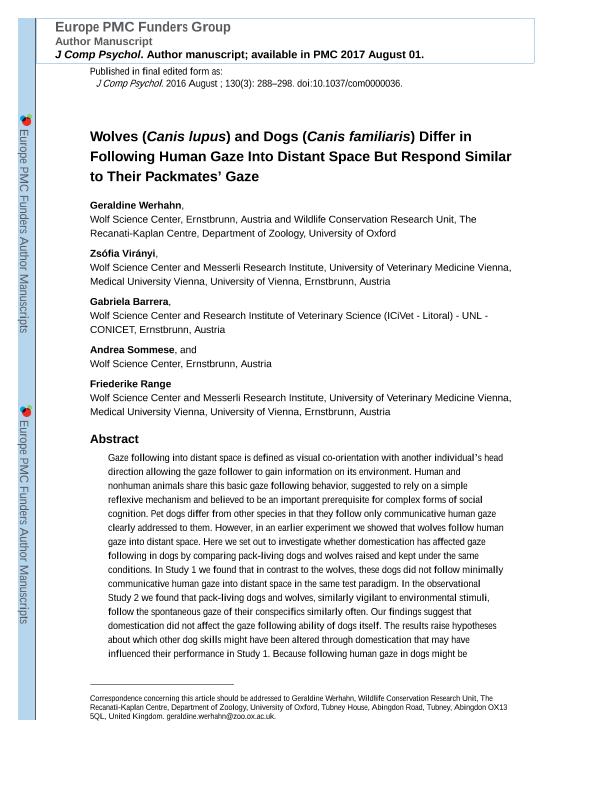Mostrar el registro sencillo del ítem
dc.contributor.author
Werhahn, Geraldine
dc.contributor.author
Virányi, Zsófia
dc.contributor.author
Barrera, Gabriela Luciana

dc.contributor.author
Sommese, Andrea
dc.contributor.author
Range, Friederike
dc.date.available
2018-08-07T22:30:08Z
dc.date.issued
2016-08
dc.identifier.citation
Werhahn, Geraldine; Virányi, Zsófia; Barrera, Gabriela Luciana; Sommese, Andrea; Range, Friederike; Wolves (Canis lupus) and dogs (Canis familiaris) differ in following human gaze into distant space but respond similar to their packmates' gaze; American Psychological Association; Journal of Comparative Psychology; 130; 3; 8-2016; 288-298
dc.identifier.issn
0735-7036
dc.identifier.uri
http://hdl.handle.net/11336/54523
dc.description.abstract
Gaze following into distant space is defined as visual co-orientation with another individual's head direction allowing the gaze follower to gain information on its environment. Human and nonhuman animals share this basic gaze following behavior, suggested to rely on a simple reflexive mechanism and believed to be an important prerequisite for complex forms of social cognition. Pet dogs differ from other species in that they follow only communicative human gaze clearly addressed to them. However, in an earlier experiment we showed that wolves follow human gaze into distant space. Here we set out to investigate whether domestication has affected gaze following in dogs by comparing pack-living dogs and wolves raised and kept under the same conditions. In Study 1 we found that in contrast to the wolves, these dogs did not follow minimally communicative human gaze into distant space in the same test paradigm. In the observational Study 2 we found that pack-living dogs and wolves, similarly vigilant to environmental stimuli, follow the spontaneous gaze of their conspecifics similarly often. Our findings suggest that domestication did not affect the gaze following ability of dogs itself. The results raise hypotheses about which other dog skills might have been altered through domestication that may have influenced their performance in Study 1. Because following human gaze in dogs might be influenced by special evolutionary as well as developmental adaptations to interactions with humans, we suggest that comparing dogs to other animal species might be more informative when done in intraspecific social contexts.
dc.format
application/pdf
dc.language.iso
eng
dc.publisher
American Psychological Association

dc.rights
info:eu-repo/semantics/openAccess
dc.rights.uri
https://creativecommons.org/licenses/by-nc-sa/2.5/ar/
dc.subject
Canis Familiaris
dc.subject
Canis Lupus
dc.subject
Comparative Study
dc.subject
Distant Space
dc.subject
Gaze Following
dc.subject.classification
Psicología

dc.subject.classification
Psicología

dc.subject.classification
CIENCIAS SOCIALES

dc.title
Wolves (Canis lupus) and dogs (Canis familiaris) differ in following human gaze into distant space but respond similar to their packmates' gaze
dc.type
info:eu-repo/semantics/article
dc.type
info:ar-repo/semantics/artículo
dc.type
info:eu-repo/semantics/publishedVersion
dc.date.updated
2018-07-05T18:05:46Z
dc.journal.volume
130
dc.journal.number
3
dc.journal.pagination
288-298
dc.journal.pais
Estados Unidos

dc.journal.ciudad
Washington
dc.description.fil
Fil: Werhahn, Geraldine. Wolf Science Center; Austria. University of Oxford; Reino Unido
dc.description.fil
Fil: Virányi, Zsófia. Wolf Science Center; Austria. Universidad de Viena; Austria
dc.description.fil
Fil: Barrera, Gabriela Luciana. Wolf Science Center; Austria. Consejo Nacional de Investigaciones Científicas y Técnicas. Centro Científico Tecnológico Conicet - Santa Fe. Instituto de Ciencias Veterinarias del Litoral. Universidad Nacional del Litoral. Facultad de Ciencias Veterinarias. Instituto de Ciencias Veterinarias del Litoral; Argentina
dc.description.fil
Fil: Sommese, Andrea. Wolf Science Center; Austria. Universidad de Viena; Austria
dc.description.fil
Fil: Range, Friederike. Wolf Science Center; Austria. Universidad de Viena; Austria
dc.journal.title
Journal of Comparative Psychology

dc.relation.alternativeid
info:eu-repo/semantics/altIdentifier/doi/http://dx.doi.org/10.1037/com0000036
dc.relation.alternativeid
info:eu-repo/semantics/altIdentifier/url/http://psycnet.apa.org/record/2016-26311-001
dc.relation.alternativeid
info:eu-repo/semantics/altIdentifier/url/https://www.ncbi.nlm.nih.gov/pmc/articles/PMC5321535/
Archivos asociados
